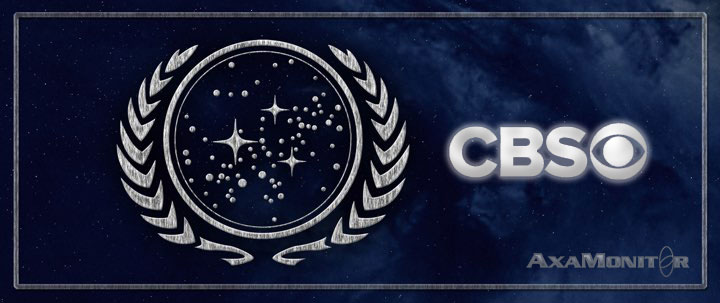
Table of Contents
CBS Studios
CBS Studios Inc., formally CBS Studios International, is one of the two named plaintiffs in the legal complaint against Alec Peters and Axanar Productions, producers of the short Star Trek film, Prelude to Axanar and the feature Axanar, formerly Star Trek: Axanar.
CBS is the copyright owner of the Star Trek brand, entitling it to production of television series based on those copyrights, while Paramount Pictures holds the exclusive license for production of Star Trek motion pictures.
Legal Representation
While CBS certainly has its own in-house counsel, it and Paramount are being represented by the law firm, Loeb & Loeb, whose attorney, Jonathan Zavin, is leading the case against Axanar.
Corporate Structure
 CBS Studios International was once CBS Paramount International Television, and is a multinational television production and distribution arm of CBS Television Studios. All are owned by the CBS Corporation, formed in 2004 by Viacom as CBS Paramount International Television, a result of a merger between two television companies, CBS Broadcast International and Paramount International Television. Since September 26, 2006, the company is part of the CBS Television Distribution Group.
CBS Studios International was once CBS Paramount International Television, and is a multinational television production and distribution arm of CBS Television Studios. All are owned by the CBS Corporation, formed in 2004 by Viacom as CBS Paramount International Television, a result of a merger between two television companies, CBS Broadcast International and Paramount International Television. Since September 26, 2006, the company is part of the CBS Television Distribution Group.
CBS and Star Trek
At Star Trek’s creation, Norway Productions, Roddenberry’s production company, shared ownership with Desilu Productions and, after Gulf+Western acquired Desilu in 1967, also with Paramount Pictures, the conglomerate’s film studio. Paramount did not want to own the unsuccessful show; net profit was to be shared between Norway, Desilu/Paramount, star William Shatner, and the NBC television network.
However, Star Trek lost money, and the studio did not expect to syndicate it. In 1970, Paramount offered to sell all rights to Star Trek to Roddenberry, but he could not afford the $150,000 price ($914,000 in 2007 dollars).
In 1989, Gulf+Western renamed itself Paramount Communications, and in 1994 merged with Viacom. In 2005, Viacom divided into CBS Corporation, whose CBS Television Studios subsidiary retained the Star Trek brand, and Viacom, whose Paramount Pictures subsidiary retained the Star Trek film library and rights to make additional films, along with video distribution rights to the TV series on behalf of CBS.
New Series
CBS is producing a new series, Star Trek: Discovery, set to debut on the CBS broadcast network in 2017, and continuing exclusively on its video-streaming platform, CBS All Access.1)
Portions of this article were adapted from the articles, CBS Studios International, and Star Trek.
CBS announced noted producer Bryan Fuller (Hannibal, Pushing Daisies, Star Trek: Deep Space Nine and Star Trek: Voyager) would lead the series as the show runner,2) followed by news that veteran writer-producer Nicholas Meyer (Star Trek II: The Wrath of Khan) was also joining the writing staff of the new series.3)
Fan Films
See also: CBS Officials

CBS has a long but unofficial relationship with fans who have produced their own Star Trek-based video series and films. Entertainment attorney Mary Ellen Tomazic calls fan productions’ traditionally non-commercial copyright infringement “tolerated use”:
[Such use] is allowed by the rights holder despite knowing someone is infringing on their work. The understanding of fan film makers is that under these unwritten rules they cannot profit from their fan film in any way, and it must remain noncommercial (i.e., not for sale) and noncompetitive with the original work.4)
From humble beginnings at the turn of the century of productions like Star Trek: Hidden Frontier, which shot more than 50 episodes against a green screen in a fan’s spare bedroom, modern Star Trek fan films, such as Star Trek: New Voyages, Star Trek Continues and Star Trek: Renegades, have advanced to soundstages with physical sets, full-blown CGI special effects and professional actors (many from the several official Star Trek TV series).
Crowdfunding
The advent of crowdfunding platforms such as Kickstarter and Indiegogo transformed these home-grown, largely self-financed productions into something substantially different, raising hundreds of thousands of dollars, but Axanar outpaced them all, becoming the first fan production to exceed a million dollars in crowdfunding.5)
On April 21, 2016, CBS advised Tommy Kraft, the producer of the well-received Star Trek–Horizon, to cancel his planned $250,000 Kickstarter campaign for a sequel, Federation Rising — the advice stemming from the lawsuit against Axanar, with more fan films on a list to be similarly suspended.6)
The move presaged a severe restriction on crowdfunding by Star Trek fan films, on account of the Axanar case. Production guidelines released by CBS and Paramount on June 23, 2016, placed a $50,000 limit on crowdfunding fan productions that were henceforth limited to no more than 30 minutes in length.
Axanar
Axanar producer Peters emerged from a face-to-face meeting with CBS licensing personnel in August 2015 saying:
“CBS has a long history of accepting fan films. I think ‘Axanar’ has become so popular that CBS realizes that we’re just making their brand that much better.”7)
CBS has never officially sanctioned fan films, understanding that doing so could compromise control over their own intellectual property. It characterized that August 2015 meeting with Peters differently, telling The Wrap:
“CBS has not authorized, sanctioned or licensed this project in any way, and this has been communicated to those involved. We continue to object to professional commercial ventures trading off our property rights and are considering further options to protect these rights.”8) [emphasis added]
CBS and Paramount filed suit just four months later.
'Trading Off Our Property Rights'
The “professional commercial venture” Peters was engaged in was the now-abandoned studio he was building with fans’ money rather than producing Axanar, as well as an online merchandise operation. Just weeks after CBS’ warning, in an interview on the Chicks Who Script podcast, Peters scoffed at the idea CBS would sue him, and went on to describe his real goal:
The studio is the endgame. The idea is we create a studio that we can then [use to] produce our own original content, our own movies. … The idea is to produce our own original content.9)
Guidelines
Following J.J. Abrams’ promise that the Axanar lawsuit was ”going away,” the two studios issued a statement in which they said they were working on a set of guidelines for fan films, something Axanar producer Alec Peters claimed he always wanted.
Despite Peters’ effort to propose his own set of guidelines, other fan productions quickly disavowed them. On June 23, 2016, CBS and Paramount released a set of official Star Trek fan film guidelines that would, among other restrictions, preclude the use of any film industry professionals and the running times of the major fan films, including Axanar.
The announcement proved controversial, with groups of fans calling for various kinds of boycotts of CBS and Paramount products, or just of Star Trek films and the 2017 series.
Keywords



